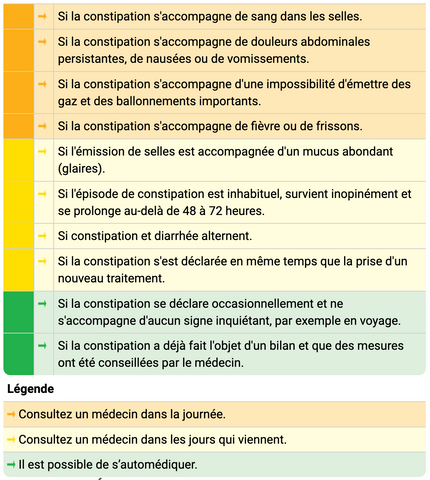What to remember:
- Diarrhea is when there are frequent (more than three times a day) and abundant liquid or loose stools.
- Acute diarrhea can be of infectious, physiological or hormonal origin.
- There are many causes of stomach pain with chronic diarrhea: food intolerances, medications, or even irritable bowel syndrome.
- There are solutions to relieve and prevent the occurrence of stomach aches and diarrhea (diet, hydration, probiotics, etc.).
Stomach aches and diarrhea are common gastrointestinal issues that can disrupt our daily lives. They can have a variety of causes. In this article, we'll reveal the reasons we experience these ailments, solutions to relieve and prevent them, and the best course of action depending on your symptoms.
Why do we suffer from stomach ache accompanied by diarrhea?
Stomach aches and diarrhea can be the result of a variety of factors. Diarrhea occurs when there are frequent (more than three times a day) and abundant liquid or loose stools. This disorder is usually accompanied by pronounced stomach pain such as cramps , spasms or even nausea. There are two types of diarrhea: acute diarrhea , which is occasional and often caused by viral or bacterial infections, and chronic diarrhea , which persists over time and can result from various causes such as chronic digestive disorders or inflammatory diseases.
The origins of a stomach ache with acute diarrhea
Diarrhea and stomach aches can occur due to infections, psychological or hormonal factors.
Infectious origins
Infectious causes are one of the main causes of stomach pain and acute diarrhea. Pathogens such as viruses, bacteria, and parasites can enter the gastrointestinal system and disrupt its normal functioning. Viral gastroenteritis and food poisoning are common examples of gastrointestinal infections.
These pathogens are often transmitted through consumption of contaminated food or water, as well as close contact with infected people. Symptoms include abdominal pain, cramps, nausea, vomiting, and severe diarrhea. Infection can last from a few days to several weeks, and dehydration can be a serious risk, especially in young children and the elderly.
Physiological origins
Certain physiological conditions can also trigger stomach pain and diarrhea. Food intolerances, such as lactose intolerance or gluten sensitivity, can lead to unpleasant gastrointestinal symptoms. The intestine cannot properly process these substances, resulting in unpleasant symptoms. Additionally, certain conditions, such as irritable bowel syndrome (IBS), can lead to abdominal pain and episodes of diarrhea or constipation. Dietary factors and stress can also influence the onset of these symptoms. In fact, it is well known that periods of stress or nervousness are synonymous with diarrhea and stomach pain for some people. The expression "having a knot in your stomach" perfectly captures this phenomenon.
Hormonal origins
Hormones play an important role in regulating bodily functions, including digestion. In women, hormonal fluctuations during the menstrual cycle can affect how the digestive system functions. Some women experience abdominal pain and episodes of diarrhea shortly before or during their periods. Although the exact mechanisms are not fully understood, it is clear that hormones have an impact on intestinal motility and sensitivity.
The origins of a stomach ache with chronic diarrhea
If symptoms of stomach pain and diarrhea persist for several weeks or become recurrent, this may indicate more complex underlying issues. Here are several examples of conditions or illnesses that can cause stomach pain and diarrhea over the long term.
- Medications: Some medications, such as antibiotics, can disrupt the balance of normal intestinal flora, which can cause imbalances in the digestive system and lead to stomach aches and diarrhea.
- Food intolerances: Food intolerances, such as lactose or gluten intolerance, occur when the body has difficulty digesting specific food substances. They occur in both children and adults. They can cause gastrointestinal symptoms such as stomach aches, bloating , and diarrhea after eating foods containing them. Blood tests can determine the exact cause of these symptoms.
- Irritable bowel syndrome (IBS): IBS is a functional disorder of the digestive system characterized by recurring stomach aches and bowel movements (diarrhea or constipation). The exact cause is unclear, but stress, diet, and increased intestinal sensitivity are possible factors.
- Crohn's disease: This is a chronic inflammatory bowel disease (IBD) that can affect the entire digestive tract. It causes chronic inflammation of the intestinal wall. This inflammation can cause severe stomach pain, frequent diarrhea, and rectal bleeding. Symptoms can vary in intensity and often require ongoing medical treatment to manage inflammation and relieve symptoms.
Our tips for relieving and preventing stomach aches with diarrhea
When stomach aches and diarrhea strike, it's important to take steps to relieve the symptoms and minimize their impact on your well-being. Don't panic, we're here to guide you! Here are some tips:
1 - Ensure good hydration
Diarrhea causes a significant loss of water and electrolytes through stool. To prevent dehydration, it is essential to drink plenty of water and hydrating fluids such as broth and herbal teas. If you cannot tolerate liquids due to nausea, take small, frequent sips. It is essential to ensure you stay hydrated .
2 - Adopt a diet that is gentle on your stomach
When you experience stomach pain and diarrhea, choose mild, easily digestible foods. Examples include cooked rice, bananas, and unsweetened applesauce. Be sure to avoid fatty, spicy, and high-fiber foods, as these can aggravate symptoms. Also, avoid irritating foods and drinks, which can increase abdominal discomfort and stool frequency.
3 - Over-the-counter medications, with medical advice
Over-the-counter antidiarrheals can help slow bowel movements and reduce bowel movements. However, these medications should not be used excessively, as they could prolong an underlying infection or illness. Be sure to consult a healthcare professional before using any medication.
What should I do if I have a stomach ache and stools?
Depending on the severity of the symptoms and the nature of the stool, here are the actions to consider:
-
Mild symptoms: If the stomach ache and diarrhea are mild, it is usually possible to manage them at home by following the advice mentioned above.
-
Severe symptoms: If you experience severe abdominal pain, high fever, blood in the stool, or dehydration, consult a healthcare professional.
- Chronic symptoms: If symptoms persist or recur frequently, consult a physician for a thorough diagnosis and an appropriate treatment plan.
Below is a detailed table of possible situations and the associated procedure:

Image source: https://www.vidal.fr/maladies/estomac-intestins/mal-ventre-adulte/que-faire.html













